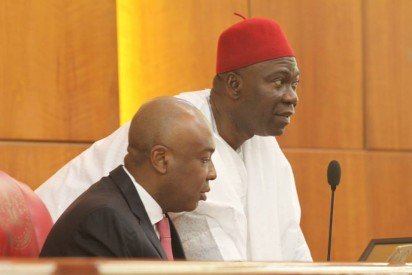Moves by the majority All Progressives Congress to remove the Deputy Senate president Ike Ekweremadu barly two weeks after he was elected to that position were forestalled on Wednesday.
The election of Ekweremadu from the opposition Peoples Democratic Party to that position has had unsettling repercussions on APC, with members of the Unity Forum vowing to remove him.
Daily Trust reports that the Enugu-West senator was saved by the Senate President Bukola Saraki when senators of the majority All Progressives Congress (APC) moved a motion that his election be quashed.
Ekweremadu, who was elected on June 9, is of the opposition Peoples Democratic Party (PDP) which has 49 senators while the APC has a slim majority with 60 senators.
t Ekweremadu caused an upset when he led all PDP senators to team up with eight APC senators on inauguration day to elect Saraki Senate President against Ahmed Lawal who was nominated by the ruling party to occupy the seat.
For his effort in the installation of Saraki, Ekweremadu was elected deputy senate president, a position he had previously occupied for eight years when his party was in the majority.
Nearly the same scenario played out in the House of Representatives where PDP helped Dogara defeat his party’s chosen candidate for the post, Femi Gbajabiamila.
A two-week recess had failed to resolve the crisis leading to yesterday’s attempt to remove Ekweremadu.
When the Senate reconvened yesterday Senator Kabiru Marafa (APC, Zamfara) raised a point of order where he said Ekweremadu’s election breached Senate standing rules.
He said the Senate 2011 rules, provide that election of presiding officers shall be by division and not secret ballot where two contestants are vying for any of the positions.
Marafa said Ekweremadu defeated Senator Ali Ndume of the APC through secret ballot. He wondered when the rules were amended and requested for an explanation from Saraki.
Marafa, who was cheered by most of his APC colleagues, cited Order 110 and 3 (e1), which he said provides that “Any senator desiring to amend any part of the rule shall give reason and write to the president of the senate after which the process of amending the relevant section will be done.”
“I am raising this Order in reference to the event of June 9, 2015 on this chamber. I have two Order books, and I think there is need for the President to rule on which to be used.
“I got the Order of 2011 when I was sworn in, and I got a new one this year. I cannot remember when we amended our rules. I am reading Senate Standing Order 2011 as amended,” he said.
He said based on the 2011 Senate Standing Order, there is no provision for secret ballot but that the 2015 Standing Order as amended, Rule 3 (3e) provides that when two or more senators are nominated for the office of the senate president or deputy senate president, voting shall be done by secret ballot.
At this point, some PDP lawmakers tried to shout down Marafa but his APC colleagues continued to cheering him on.
The Zamfara senator continued: “There is a conflict with these two books, which one are we going to use in this chamber?
“I want Mr President to address two or three things: which of these two books is going to guide our proceedings?
“On the proceedings of that day (June 9) with regards to the deputy senate president, we need explanation as to why it was amended and how,” he said.
After Marafa took more than 10 minutes to make his case, Ekweremadu stood up to make clarification on the matter where he said from 1999 to date, the Senate has been having different rules.
He said: “There was that of 1999, 2003, 2007, 2011 and now 2015.”
He said based on constitutional provision, the Senate and the House shall stand dissolved by the end of four years after their tenure, adding that based on that, the 2011 rules have expired.
“The 2015 rules will also expire in 2019 and then we will have new ones,” he added.
Ruling on the matter, Senate President Bukola Saraki, said the Senate Standing Rules is that of 2015, adding that the issue of the election of the deputy Senate president was covered by the rules. He consequently ruled Marafa out of order.
Marafa was later summoned by Senator Ahmad Yarima (APC, Zamfara) where they had a long discussion.
Our correspondent reports that election of presiding officers in the Senate has been through open ballot, what they termed as division, since 1999. The same thing obtained in the House of Representatives for 12 years until 2011, when shortly before the expiration of the 6th Assembly, the lawmakers amended their rules to allow election of presiding officers via secret ballot, in an apparent move to pay the way for Tambuwal to emerge as speaker against the then PDP’s preferred candidate Mulikat Akande-Adeola.
Prior to the inauguration of the 8th Assembly, there were some moves to amend that of the House to make the election of presiding officers conducted in an open ballot, but the proposal never came to the floor of the House.














